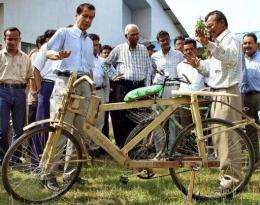Bamboo bikes are export success for Ghana

The sight of tall, green bamboo stalks swaying above the dusty lands of his west African country led Ibrahim Djan Nyampong to an unusual conclusion: bicycles.
Under the shade at a workshop in Ghana, young artisans are making them -- from mountain racers to cargo bamboo bikes -- to suit needs of customers, now as far afield as the United States and Europe.
"The beginning was not easy as people thought it was a joke to make bicycles from bamboo," Nyampong said as he supervised work at the small factory outside Accra. "Now people are warming towards the bamboo bike."
With bamboo a strong, affordable and environmentally friendly material readily available to manufacturers, African countries including Ghana, Uganda and Zambia have seen the start of production of such bicycles.
It hasn't gone unnoticed. The Ghana initiative is one of 30 recipients of the 2010 United Nations Environmental Programme SEED awards for projects that tackle poverty while promoting the sustainable use of resources.
American engineer Craig Calfee, among those credited with introducing the sturdy bicycles to Africa's rugged terrain, said he developed the technique in 1995.
It was not until 10 years later that he perfected the art and got his first bamboo bike on the market.
The idea of joining bamboo tubes with epoxy-soaked fibre crossed his mind when he was thinking of a "fun bike to draw publicity at a trade show."
"While I am not the first to make a bicycle from bamboo, I am the inventor of the most effective method that most people are using now," he said.

Bamboo grows quickly and has been popular with furniture crafters, among other industries, but it is now winning the hearts of environmentalists seeking sustainable building materials.
Bamboo bicycles can be designed to suit individual needs, including "school bus bikes" with multiple seats.
Able to handle shocks and vibrations as well as heavy loads, the bikes have been seen as a potential solution for rural farmers -- though the $150 price for the labour-intensive product has limited sales locally.
"My friends have been using the bikes for a long time and they are still strong," said 60-year-old farmer Kofi Kugbelenu, who travelled 320 kilometres (200 miles) from the Volta Region to place an order.
"I’m buying one for myself and one for my son."
After harvesting, stalks are smoked and heat-treated to prevent splitting. The tubes are then tacked with adhesive and wrapped using epoxy-impregnated fibre.
While frames are moulded from bamboo, pedals, wheels and saddles are made of conventional materials. Nyampong said his organisation is trying to develop its own bamboo bike handles and crash helmets.

Export demand has surged since the bikes were exhibited during President Barack Obama's visit to Ghana in 2009.
"Business is now booming, especially in the area of export," said Nyampong. He said his company expects to sell about 300 bikes this year, mostly for export to the United States and Austria.
After six months on a tour of east and west Africa, Calfee came away with the impression that bamboo bikes would succeed.
"I remembered that there was a lot of bamboo, people valued bicycles and there was a great need for jobs," he said.
The price puts the bicycles beyond the reach of many rural farmers in Ghana, where about a third of the population lives below the poverty threshold.
But Nyampong, who has been making the bicycles since 2007, believes that with time the price will come down and demand for bamboo bikes will spike.
Producing the bikes does not require costly infrastructure, but takes a large amount of time and effort.
"You do not need to import the bamboo. There are plenty in the bush. Without electricity you can manufacture a bike," said apprentice Prince Addo-Asante at the factory in Sowutuom, a small town on the fringes of the seaside capital Accra.
(c) 2011 AFP


















